From Overwhelmed to On Track: A Career Masterclass for Young Professionals at PRIME 2025
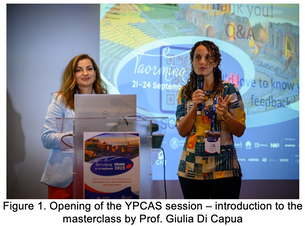
The Young Professionals in Circuits and Systems (YPCAS) event at the International Conference on PhD Research in Microelectronics and Electronics (PRIME 2025) offered an inspiring and interactive space for reflection, learning, and connection among early-career researchers and engineers within the IEEE Circuits and Systems community. Held on September 23rd, 2025, in Taormina, Italy, the event focused on professional growth, mental well-being, and resilience, blending practical coaching, interactive activities, and open discussion. It successfully promoted self-leadership, inclusion, and mentorship in alignment with the Society’s commitment to holistic professional development.
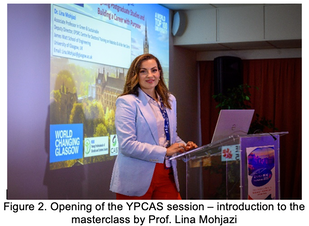
Organized and moderated by Prof. Giulia Di Capua from the University of Cassino and Southern Lazio, with Prof. Lina Mohjazi from the University of Glasgow as keynote speaker, the YPCAS session addressed the growing need for spaces where young researchers can reflect on their career journeys beyond the purely technical dimension (Figure 1). The title “From Overwhelmed to On Track” embodied the aim of helping participants regain clarity, motivation, and confidence while navigating the demanding landscape of postgraduate research and early professional life. Against the picturesque backdrop of Taormina, the event offered attendees a unique opportunity to step back from the pressures of research and engage in open conversation about personal growth, mental health, and building sustainable careers in science and engineering. The masterclass combined storytelling, reflection, and participatory exercises inspired by coaching methodologies (Figure 2). The program unfolded progressively, fostering self-awareness and actionable insights for personal and professional development. The opening activity invited participants to position themselves along a timeline representing their academic path, visually sharing whether they were at the beginning, middle, or end of their PhD journey. This icebreaker immediately created empathy and a sense of connection among the group.
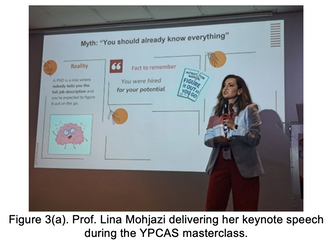
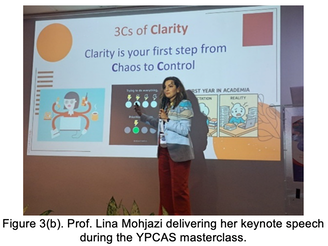
The discussion then focused on redefining success in postgraduate studies, challenging the common academic myth that “success equals publications” and emphasizing instead personal growth, collaboration, and work-life balance. Participants were encouraged to reflect on the most difficult aspects of their journeys, both emotionally and practically. A particularly engaging moment was dedicated to the themes of impostor syndrome and self-sabotage. Prof. Lina Mohjazi shared personal experiences of self-doubt and perseverance, encouraging attendees to embrace vulnerability as a source of strength (Figures 3a–3b). This was followed by a “coaching circle”, where participants exchanged anonymous messages of encouragement, transforming individual vulnerability into collective empowerment. Prof. Mohjazi’s keynote connected her research trajectory to reflections on purpose-driven work, confidence, and authenticity, offering valuable insights on how to build meaningful and sustainable careers. Her talk was warmly received by the PRIME 2025 organizers (Figure 4) and stood out as one of the conference highlights, deeply resonating with PhD students and early-career researchers. The closing discussion addressed issues such as professional uncertainty, motivation, and resilience, emphasizing that success is not linear and that meaningful careers are built through adaptability, self-knowledge, and community support. The event concluded with a networking cocktail that provided an informal setting for continued dialogue and new connections (Figure 5). The relaxed atmosphere fostered genuine conversations that extended well beyond the scheduled program, reflecting the sense of belonging that YPCAS initiatives strive to create.
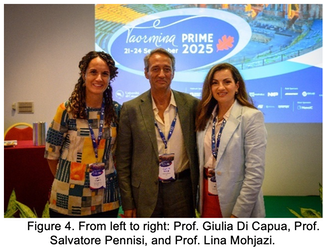
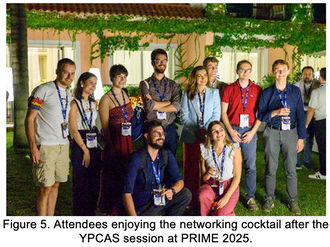
Sincere gratitude is extended to Prof. Salvatore Pennisi and Prof. Alfio Dario Grasso, General Chairs of PRIME 2025, for their hospitality and support in integrating YPCAS activities into the main conference program. Appreciation also goes to Dr. Gianluca Giustolisi for providing beautiful photographs of the event, as well as to the PRIME 2025 organizing team and volunteers for their contribution to logistics and promotion. Special thanks are due to Prof. Lina Mohjazi for her inspiring and heartfelt participation, and to the IEEE Circuits and Systems Society (CASS) for its financial support and continuous commitment to diversity, inclusion, and mentorship.
Reported by Giulia Di Capua, DEICAS chair, IEEE CASS, University of Cassino and Southern Lazio